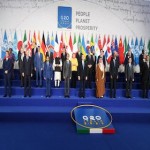Just as Rome was not built in a day, so a holistic vision of the G20, comprising the world’s major economies, needs sustained endeavours. At its 30-31 October Leaders’ Summit in Rome, the grouping took several important steps to accelerate economic recovery, enhance health security and strengthen multilateralism. Leaders’ working sessions held at La Nuvola, a new congress centre designed by the Italian artist Massimiliano Fuksas, saw the G20 in full play as the world’s premier forum for international economic cooperation.
This has not been easy to pull off. There were constraints under which the Rome summit functioned. The leaders of China, Russia, Mexico and Japan did not show up in person. Had they attended physically, particularly the first two, it would have probably contributed to a dilution of the tensions that mark global geopolitics today. Moreover, as the G20 summit was held back-to-back with the high-profile COP26 climate summit at Glasgow, the former had to strive hard to draw the international media’s optimal attention to itself. In fact, the G20’s measured decisions on climate change heralded the contours of likely solutions at Glasgow.
The Rome Declaration issued at the G20 consists of 51 meaty paragraphs. It is anchored on 20 Ministerial declarations and 29 Working Groups’ documents. One has to be content by highlighting five major outcomes here.
One, the G20 noted that economic recovery was moving at “a solid pace” but it was “highly divergent across and within countries.” To consolidate it, the adverse effects of COVID-19 will be addressed through an updated version of the June 2021 Action Plan, designed to support the stability of the global economy.
Two, top priority on the health front is assigned to ensuring “timely, equitable and universal access” to vaccines, therapeutics and diagnostics. The G20 accepted the WHO recommendation to arrange the vaccination of 40% of the global population by end-2021 and 70% by mid-2022. This necessitates considerable expansion in production, supply chain resilience and financial resources. It is an uphill task, considering the present reality. As Antonio Guterres, UN Secretary-General pointed out, “While wealthy countries are rolling out third doses of the COVID-19 vaccine, only about 5% of people in Africa are fully vaccinated. This is a global shame.”
Three, health security in the future being a significant concern, stress was laid on “PPR” – pandemic preparedness and response – so the world can handle future pandemics better than it did COVID-19. Two specific measures agreed for this purpose are the formation of a joint task force of finance and health ministers, and the establishment of “a financial facility” in coordination with WHO.
Four, on the inter-linked themes of energy and climate, the leaders resolved to work for the success of the Glasgow conference by reaffirming their commitment to the full implementation of UNFCC and the Paris Agreement. The notable forward step was “to pursue efforts” to limit the global average temperature to 1.5°C above pre-industrial levels, as part of moving towards the global net-zero goal. But sufficient balancing was done to accommodate the developing countries’ perspective that “different approaches” and “clear national pathways” should be taken into account. Importantly, developed countries have been reminded of their obligations regarding more outflow of finance and technology as well as to adopt “sustainable and responsible consumption and production” patterns, in harmony with the 2030 Sustainable Development Agenda.
Five, on the financing needs of developing countries, the IMF will establish a new Resilience and Sustainability Trust (RST) which will provide affordable long-term assistance to low-income countries. This will build on the G20 Debt Service Suspension Initiative (DSSI), created under the Saudi G20 presidency in 2020. So far, a total debt of $12.7 billion has been deferred, bringing considerable relief to developing countries. Measures beyond DSSI are also under consideration. Reform in international taxation and endorsement of a 15% minimum tax rate for corporations is true “a historic achievement”, indicating that the G20 persuaded profit-makers to accept this in self-interest.
The Indian delegation led by Prime Minister Narendra Modi played a significant, probably defining, role, especially in the absence of top Eurasian leaders. The imprint of India’s contribution was visible in formulations relating to climate change, energy, agriculture, international taxation, anti-corruption and counter-terrorism measures – all issues persistently pursued by India at G20 discussions. Modi’s pull-asides and bilateral meetings with key participants kept the limelight on India’s purposeful pro-activism. Even as India announced its goal to reach net-zero emissions by 2070, Piyush Goyal, India’s G20 Sherpa, reminded the media that technologies needed to transition to clean energy and innovation still did not exist. With India’s start-up sector blooming, such innovations could well come from India before they are readied by the West.
The next three nations to hold the G20 presidency are Indonesia in 2022, India in 2023 and Brazil in 2024 – all three developing countries. From 1 December 2021, the new G20 troika will comprise Italy, Indonesia and India. The G20 will now acquire greater salience in India’s foreign policy. It is a natural transition to India sharpening its economic diplomacy, and showcasing its leadership role in world affairs.
This article was first published in the Hindustan Times.
Rajiv Bhatia is Distinguished Fellow, Foreign Policy Studies Programme, Gateway House and former Ambassador.


